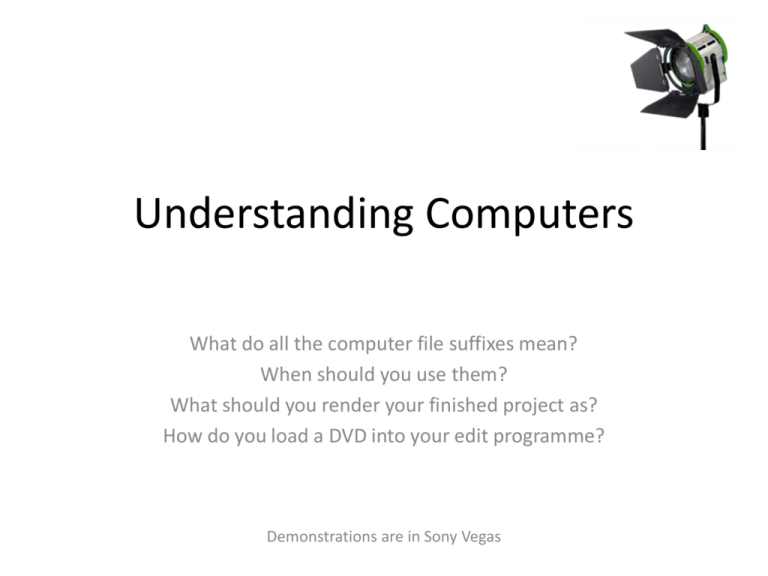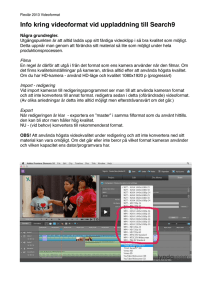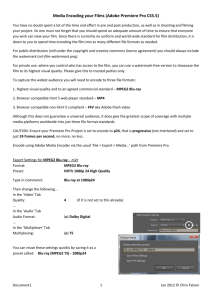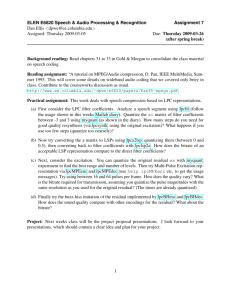Understanding Computers + Using You Tube and Vimeo
advertisement

Understanding Computers What do all the computer file suffixes mean? When should you use them? What should you render your finished project as? How do you load a DVD into your edit programme? Demonstrations are in Sony Vegas Some examples of the significant numbers of video file types Video File Types (fileinfo.com) The Video Files category includes a wide range of video formats, which use different codecs to encode and compress video data. This category also includes video project files and video information files, which may not contain video data. Common video file extensions include .MPG, .MOV, .WMV, and .RM. Popularity .gfp GreenForce-Player Protected Media File .m21 AXMEDIS MPEG-21 File Extension File Description .aep After Effects Project .sfd Sofdec Dreamcast Movie .mani Mine-imator Project File .wlmp Windows Live Movie Maker Project File .mk3d Matroska 3D Video File Microsoft Photo Story Project File .mproj Mine-imator Project .wp3 .rdb Wavelet Video Images File .dzp DirectorZone Particle Effect File .rmp ScreenCam Screen Recording RealPlayer Metadata Package File .scm .rv Real Video File .rms Secure Real Media File .screenflow ScreenFlow Document .dir Adobe Director Movie .sec .mswmm Windows Movie Maker Project Samsung Security Video File .bik Bink Video File .swt Flash Generator Template .dzm DirectorZone Menu Template .usm USM Game Video File .3gp 3GPP Multimedia File .vcpf VideoConvert Project File .wpl Windows Media Player Playlist .viewlet Qarbon Viewlet .psh Photodex Slide Show .bnp Sony Camcorder Video Data File .ntp Natron Project File .dnc Windows Dancer File .trp HD Video Transport Stream .ivf Indeo Video Format File .vro DVD Video Recording Format .mp4.infovid Parrot AR Drone and Gyro Flyer Video .amc AMC Video File .wm Windows Media File .bdmv Blu-ray Disc Movie Information File .swf Shockwave Flash Movie .dck Resolume Deck File .mkv Matroska Video File .veg Vegas Video Project Project Files stores all project information, including video, audio, effects, and timelines; used to save and load video projects. .aep .aup .avp .dar .ezp .fcproject .imovieproj .prproj .stu/.stx .veg After Effects Project Audacity Project File Avid Project File DVD Architect Pro File Edius Project File Final Cut Pro X Project File iMovie Project File Premiere Pro Project Pinnacle Studio project Sony Vegas Project File Video Files produced by the video camera .hdv Format for the recording of high-definition video on DV cassette tape; HDV is a a tape-based format and although a number of solutions for tapeless recording of HDV video are available, these are not covered by the HDV specification. HDV video can be recorded or printed back to tape. For domestic and consumer use, HDV video can be delivered on a Blu-ray Disc without requiring any re-encoding, or can be converted to AVCHD and delivered on an AVCHD disc, or can be downconverted to DVD-Video without being too lossy. Originally developed by JVC and subsequently supported by Sony, Canon and Sharp, the HDV format was created so as to serve as an affordable high definition format for digital camcorders. The HDV format caught on rapidly with many amateur and professional videographers owing to its low cost, portability, and an acceptable image quality for many professional productions. Video Files produced by the video camera .avchd A file-based format for digital recording and playback of high-definition video; its name is an acronym which stands for Advanced Video Coding High Definition. The AVCHD format was introduced in 2006 after being jointly developed by Sony and Panasonic, primarily for use in high definition consumer camcorders. As a format, AVCHD favors comparably to .HDV and is a format which is acceptable for professional use. Playback of the AVCHD format is not supported across all Blu-ray Disc players as even though AVCHD does share many format similarities with Bluray Disc, it is not part of the Blu-ray Disc specification. Video Files produced by the video camera .m2t High-definition video recording format used by many HD camcorders; commonly referred to as "HDV;" uses MPEG-2 compression to store HD video data .mts High-definition MPEG Transport Stream video format, commonly called "AVCHD;" used by Sony, Panasonic, and other HD camcorders; based on the MPEG-2 transport stream and supports 720p and 1080i HD video formats. .mov Common multimedia container file format developed by Apple and compatible with both Macintosh and Windows platforms; may contain multiple tracks that store different types of media data; often used for saving movies and other video files; commonly uses the MPEG4 codec for compression. MOV files may contain video, audio, timecode, and text tracks, which can be used to store and synchronize different types of media. Each media track may be encoded using one of several different codecs. In order to play a MOV file, an application must be able to recognize the specific codec(s) used in the file. Project Properties Some of the decisions to be made: •Match clip settings •Frame rate •Interlaced or progressive •Adjust source media •Deinterlace method What type of file do I render in my project? What is a codec? What is a format? A codec is a compression standard. Raw video or audio is compressed when encoding, and decompressed (decoded) on playback. A format is a file container that holds one or more codecs – video, audio, or even data. The container format contains information about the video, audio, and data tracks that it holds. Some example container formats are mov (Quicktime), mp4, wmv, and avi. What type of file do I render in my project? Each type of editing software handles files differently so it is important to learn how best to handle footage for example: Sony Vegas Smart rendering When you render video to any of the following formats, unedited video frames are passed through without recompression (smart rendering): DV AVI DV MXF IMX MXF (IMX 24p MXF is not supported for no-recompress rendering) XAVC Intra MXF HD MXF MPEG-2 (for files such as those from HDV and DVD camcorders) Panasonic P2 What type of file do I render in my project? MPEG-4 is now one of the most widely used formats. MPEG-4 Movie or video clip that uses MPEG-4 compression, a standard developed by the Moving Picture Experts Group (MPEG); commonly used for sharing video files on the Internet. H.264 or MPEG-4 Part 10, Advanced Video Coding (MPEG-4 AVC) is a video compression format that is currently one of the most commonly used formats for the recording, compression, and distribution of video content. H.264 is perhaps best known as being one of the video encoding standards for Blu-ray Discs; all Blu-ray Disc players must be able to decode H.264. It is also widely used by streaming internet sources, such as videos from Vimeo, YouTube, and the iTunes Store, web software such as the Adobe Flash Player and Microsoft Silverlight, and also various HDTV broadcasts over terrestrial (ATSC, ISDB-T, DVB-T or DVB-T2), cable (DVBC), and satellite (DVB-S and DVB-S2). What type of file do I render in my project? Quotes re quality “There are codecs that are lossless (e.g., Lagarith, HuffYUV) and you can rerender 1000 times and there will be NO LOSS of quality. Only "lossy" codecs will lose quality; "lossless" codecs will not. Also rendering "uncompressed" will not lose quality either.” “MPEG4 AVC/H.264 is lossy so re-rendering to MP4 will always lose quality even if it is "visually" lossless as you have seen.” “People are always worrying about quality when re-rendering and most of it is unfounded. I've worked on projects that were shot in HDV and we've rerendered sections back to HDV and dropped them back onto the timeline and delivered the show for national broadcast a no one could see any difference from the original HDV footage and the footage that was rendered twice so don't angst over it.” “My general rule of thumb is: "if you can't see the difference, there is no difference" ;-)” What type of file do I render in my project? Video H.264 is currently the highest quality video codec available, which means that it can usually look better at the same file size, or the same at smaller file sizes, than other codecs. It's also widely deployed, and most web browsers can play it (either natively, or via a Flash plugin), and so can many mobile devices, like the iPhone and Android. But there are licensing issues to consider. Theora is a free and open video codec with no licensing issues. It is natively playable in many browsers, including Firefox, Chrome, and Safari, but compression is a bit worse than H.264. VP8 is a newer codec. Like Theora, it is free and open. But it compresses better than Theora, and about as well as the H.264 Baseline profile. H.264 is still better in its Main and High profiles. But that will hopefully change as VP8, and VP8 encoders, mature. VP8 is expected to be widely adopted in web browsers, and can be played today in the newest versions of Chrome, Firefox, and Opera. VP6 is supported natively in Flash 8, and so is widely used on the web. It is a good codec, but doesn't compress as well as H.264. A good option is to encode to VP6 in the FLV container, with MP3 audio. MPEG-4 is often used in a 3GP format on mobile devices. WMV is a Windows codec. What type of file do I render in my project? ProRes is a line of intermediate codecs, which means they are intended for use during video editing, and not for practical end-user viewing. The benefit of an intermediate codec is that it retains higher quality than end-user codecs while still requiring much less expensive disk systems compared to uncompressed video. It is comparable to Avid's DNxHD codec or CineForm which offer similar bitrates which are also intended to be used as intermediate codecs. ProRes 422 is a DCT-based[2] intra-frame-only codec and is therefore simpler to decode than distribution-oriented formats like H.264. What type of file do I render in my project? Best setting seems to be MPEG4 h.264 for uploading to the internet. If you upload an mp4 to Youtube they will still re-encode it as they offer different viewing options. However I believe they prefer mp4 since the quality can be good and the file size small, which makes for faster uploads. Bottom line is the better quality you upload, the better your video will look. Useful tools from the internet: MediaInfo – tells you everything you need to know about a file including format, codec etc Any MPEG4 converter – converts all popular file formats to MPEG 4, rips and converts DVDs, batch processes, downloads from Youtube – costs about £20 h.264 Converter – converts from h.264 to other codecs – free converte. r Key decisions to be made: Bitrate Two Pass What type of file do I render in my project? Bit Rate and Number of Passes Single pass constant bitrate: you pick the bitrate, the encoder encodes the entire video at that bitrate. If the bitrate is very low the video will be of low quality. If the bitrate is very high the video may be of good quality but bitrate will probably be wasted on lots of shots that didn't really need it. Single pass constant quality: you pick the quality, the encoder uses whatever bitrate is necessary to deliver that quality at each frame. Two pass variable bitrate: you pick the bitrate, the encoder delivers whatever quality it can for that bitrate. The encoder makes two passes. During the first pass the encoder examines the entire video to see what parts need more bitrate and what parts need less. During the second pass it encodes the video using that information. It allocates more bitrate to parts that need it, less to parts that don't. This produces better quality than single pass CBR because bitrate isn't wasted on parts of the video that don't need it. When your primary concern is the file size you use 2-pass VBR encoding. You're saying "I don't care what the quality is, I want a file of THIS size." Because file size = bitrate * running_time. When your primary concern is quality you use constant quality encoding. You're saying "I don't care what the file size is, I what THIS quality." Loading a DVD into the project Import DVD Editing programmes usually have an option to import automatically – but it doesn’t always recognise the file Loading a DVD into the project Import DVD If importing automatically doesn’t work, manually choose or copy the file. Look for the biggest file. If it’s a .vob (DVD Video Object) file and your software doesn’t like it, try changing the suffix to .mpg



